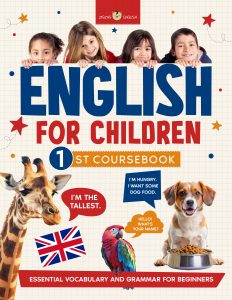I write books for Zigzag English. I’m also an English teacher, specialising in teaching children. So, a question I often hear is: “Is my child old enough to start learning English?”
The answer is “Yes!” Your child can start learning English at any age. Young children have a great ear for language, and copy the words they hear around them. If a parent is happy to spend time and effort teaching a child basic words and phrases in English, reading very simple books with them, playing little games in English, and so on, the child will start to learn English. I once taught a four-year-old Chinese girl who lived in France. Her parents spoke to her in Chinese, French and English. She spoke fluent Chinese and French, and was learning more and more English, without realising that she was learning – it was just a natural process for her.
But this approach to teaching your child a language takes time and dedication from the parent. And if you make a lot of grammar mistakes in English, you will be teaching that bad grammar to your child. So, many parents send their child to group English lessons once a week, or rely on their child’s primary school to teach them English.
These kinds of lessons often focus on learning numbers and colours, and not much more. Children arrive at secondary school with very little knowledge of English.
Is learning English at secondary school too late? I think the answer is “yes and no”. An important research study by American university MIT in 2018 found that if you want your child to speak English like a native speaker – without making grammar mistakes – then they should start learning English by the age of ten.
If you’re not aiming to achieve native-level English, then starting later is fine. Some language-learning skills – like understanding complex grammar rules – actually improve as your child gets older. Older children are also generally more focused and disciplined than younger children, so they’re more likely to respond well to homework. However, the MIT study found that the ability to learn a language declined after the age of 17 or 18. So learning English as a child is important.
When is the best age to start learning English online? Sitting at a computer and talking to someone you don’t know, and who may not speak your language, is challenging for very young children. They are unlikely to want to sit there and focus on a one-to-one lesson for half an hour or longer. In my view, online lessons work best for children who are seven years old or older. For complete beginners, I recommend seven or older for European children and eight or older for Asian children. German, French and Italian children have a great advantage over Chinese and Korean children, for example, because their native language is so much closer to English.
What about a case study? I’ve just started teaching two new students from China. They’re brothers, aged six and eight. Their mother wants them to speak English fluently, and she wants them to achieve that early. Before spending money on English lessons, she spent a few months reading English books with them and having little conversations with them in English. They’re beginners, but they’re not complete beginners, and learning with their mum has given them lots of confidence. They’ve made a great start with their English, and I can’t wait to see how quickly they can learn with two lessons a week with a native English speaker. We’re using my books for child beginners from Zigzag English, of course!
www.zigzagenglish.co.uk
Find our books on Amazon. English for Children – 1st Coursebook is for all child beginners. The Read English with Zigzag series come in German, French, Italian, Spanish and English-only editions, with bilingual vocabulary lists.




